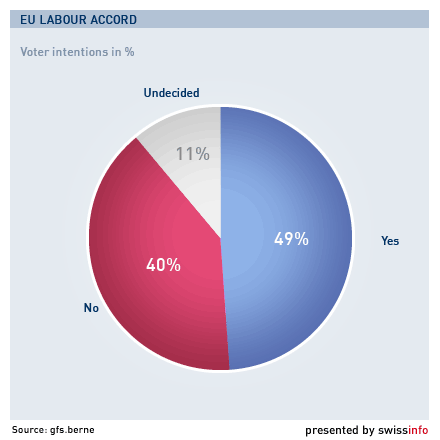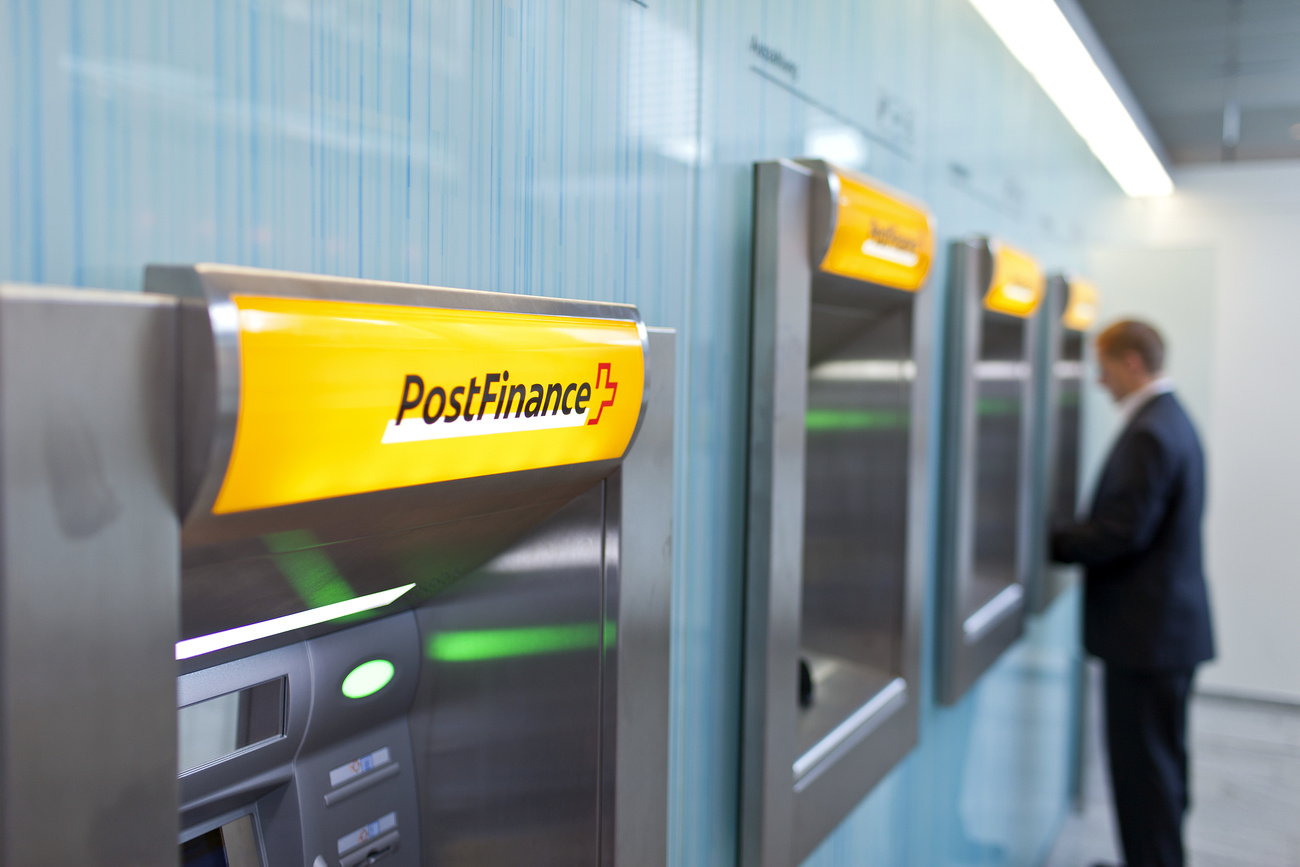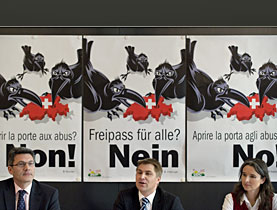Poll gives lead to backers of EU labour deal

Supporters of the continuation and extension of a labour accord with the European Union appear to have the upper hand, according to an opinion poll.
The survey, commissioned by the Swiss Broadcasting Corporation – swissinfo’s parent company – comes as the campaign by political parties, pressure groups and the business community is gathering pace ahead of the nationwide vote next month.
Just under 50 per cent of citizens said they were in favour of the labour agreement with the EU – also known as free movement of people, while 40 per cent came out against, according to Claude Longchamp of the gfs.berne research institute.
“It is not a forecast, but it indicates a trend,” says Longchamp. “If the yes camp manage to continue steering the debate, the treaty is likely to win a majority on February 8.”
He adds that the trend is similar to a previous ballot on the issue in 2005 which ultimately saw 56 per cent voters approving the extension of the accord to ten, mainly eastern EU member states.
The latest poll, published on Friday, shows a high acceptance rate in French-speaking regions ahead of the main German-speaking part of the country, while the Italian-speaking Ticino is – as expected – the least in favour of the accord.
Researchers also found clear-cut divisions along party lines with supporters of centre-left and centre-right parties coming out in favour and the grassroots of rightwing parties, including the People’s Party, set against.
Polarised
An above-average number of middle-income earners are sceptical of the labour accord as a result of concerns over jobs according to Longchamp.
“The positions of both sides are extremely polarising, but no single reason has dominated the campaign so far,” he says.
At the early stages of the campaign the main arguments of supporters focused on the key importance of the labour treaty for the competitive edge of Swiss economy and the measures in place to prevent salaries from being undercut.
Supporters also pointed out the negative effects of worsening bilateral relations with the EU – Switzerland’s main trading partner – in the case of a no vote.
For their part, opponents have highlighted increasing pressure by qualified staff from neighbouring countries on the Swiss labour market, as well as fears of a wave of criminal immigrants.
Many voters also criticise parliament for lumping two issues into one vote – the continuation of the labour deal with 25 EU member states and the extension to Bulgaria and Romania.
A second opinion poll is due to be published at the end of this month.
In full swing
The campaign has been gathering pace over the past few days with the Business Federation, political parties and committees as well as the cantonal authorities putting forward their positions in the media.
Industry captains pointed out that Switzerland’s prosperity is largely the result of exports to the EU and that a no vote would be a disaster for the Swiss economy.
The main farmers association warned that cheese exports would be at risk if the accord were rejected and that it would also result in a staff shortage in the agriculture sector.
“Every third job in our country depends on economic relations with the EU,” said Johann Schneider-Ammann.
However, the former justice minister and businessman, Christoph Blocher, a leading figure in the Swiss People’s Party, argues that a no vote would benefit the Swiss economy.
He cautioned against increasing unemployment and foreigners abusing Switzerland’s welfare system.
The party’s youth chapter and small far-right groups raised the tone even more and warned of a flood of criminal foreigners and jobless immigrants – allegations dismissed by other parties, pro-European pressure groups as well as the cantonal authorities.
“A no vote would be a dreadful own goal in times of economic crisis,” said Christian Levrat of the centre-left Social Democratic Party.

More
Free movement of people
Populist
The New European Movement Switzerland lashed out against the no camp but admitted that it was not easy to counter its populist campaign.
“They cover a wide spectrum with their anti-European rhetoric, the scaremongering and accusations of anti-democratic policy,” a statement said.
The government underlined the economic and political importance of the bilateral treaties, particularly the labour accord, with Brussels.
As for the poster campaigns by supporters and opponents, communications experts are dismissive of the efforts of both sides, describing them as “failed, uninspired, and one-dimensional”.
Supporters have been campaigning with a stylised apple tree carrying plenty of fruit. The anti-treaty campaign has posters showing large black ravens pecking at Switzerland and foreign burglars leaving a Swiss house with television sets and bags of gold.
swissinfo, Urs Geiser and Andreas Keiser
In favour: 49%
Against: 40%
Undecided: 11%
Estimated turnout: 48%
The poll was carried out among 1,201 citizens across the country between December 22 and January 4.
Voters approved the labour treaty with the old 15 EU member states with a 67% majority in 2000. It took effect from 2002.
A second vote, extending the labour treaty to ten new member states was passed with a 56% majority in 2005.
On February 8 the Swiss will decide on continuing the accord and extending it to the latest two EU member states.
Switzerland is not a member of the EU, but it has concluded 20 major bilateral accords with the 27-nation bloc.
There are also about 100 secondary bilateral accords between Bern and Brussels.
Negotiations are underway for a bilateral treaty aimed at regulating access to cross-border electricity and a free trade accord on agriculture.
In 1992 voters rejected a plan to join the European Economic Area (EEA), a halfway house to full EU membership.


In compliance with the JTI standards
More: SWI swissinfo.ch certified by the Journalism Trust Initiative












You can find an overview of ongoing debates with our journalists here . Please join us!
If you want to start a conversation about a topic raised in this article or want to report factual errors, email us at english@swissinfo.ch.